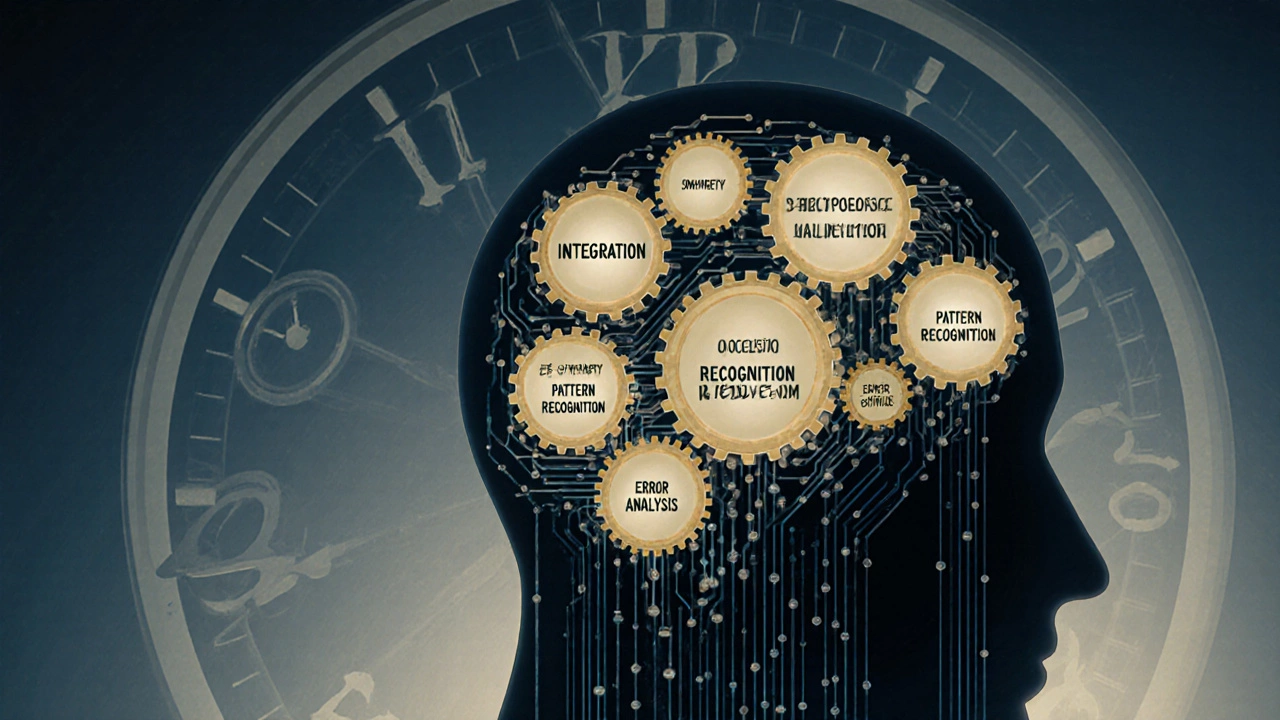Every year, thousands of students ask the same question: Does mental ability come in JEE Mains? It sounds like a deep philosophical question, but the answer isn’t about IQ tests or brain power-it’s about how your brain works under pressure, how you learn from mistakes, and how you turn confusion into clarity. If you think only geniuses crack JEE Mains, you’re already behind. The truth? Mental ability isn’t something you’re born with. It’s something you build-day after day, problem after problem.
What Mental Ability Actually Means in JEE Mains
When people say "mental ability," they often mean quick thinking, pattern recognition, or logical reasoning. But in JEE Mains, it’s not about solving a problem in five seconds. It’s about staying calm when you see a 5-step integration problem you’ve never seen before. It’s about noticing that a question about capacitors is really just an algebra problem in disguise. It’s about knowing when to skip, when to guess, and when to go back.
The JEE Mains paper doesn’t test how much you’ve memorized. It tests how well you can apply what you know under time pressure. A student who’s seen 200 similar problems will spot the trick faster than someone who’s memorized 500 formulas. That’s mental ability-not magic, not genius. It’s experience shaped by deliberate practice.
How JEE Mains Tests Your Thinking, Not Your Memory
Look at the last five years of JEE Mains papers. The questions have shifted. You won’t find direct formula applications anymore. Instead, you’ll see:
- A physics question that asks you to derive the time period of a pendulum using energy conservation, but gives you a non-standard setup.
- A chemistry problem where you have to predict the product of a reaction based on steric effects, not just reaction types.
- A math question that combines coordinate geometry with calculus to find the area under a curve defined by an inequality.
These aren’t about rote learning. They’re about transfer of knowledge. Can you take what you learned in Class 11 about Newton’s laws and apply it to a system with friction, springs, and pulleys all at once? That’s mental ability in action.
A 2024 analysis by the National Testing Agency (NTA) showed that 68% of JEE Mains questions required multi-concept integration. That’s not luck. That’s training your brain to connect dots you didn’t even know were there.
Why Memorizing Formulas Won’t Save You
Every coaching center tells you to memorize 300 formulas. But here’s the problem: JEE Mains gives you 75 minutes for 90 questions. That’s 50 seconds per question. If you’re trying to recall a formula, you’re already losing.
Students who rely on memorization freeze when the question changes slightly. They panic. They second-guess. They waste time. And that’s when mental ability becomes your lifeline.
Take this example: A question asks for the electric field at the center of a semicircular wire with uniform charge. If you’ve memorized the formula, you’re fine. But if you’ve solved 15 similar problems-ring, arc, straight wire, bent wire-you don’t need the formula. You know how symmetry works. You know how to break it into small elements. You know what cancels out. That’s mental ability.
Memorization gets you to 150 marks. Mental ability gets you to 250+.

How to Build Mental Ability (Step by Step)
You don’t need to be born smart. You need to train smart. Here’s how:
- Solve, don’t just read. Every day, do 8-10 new problems. Not the easy ones. The ones that make you pause. The ones that scare you.
- Review with purpose. After solving, ask: "Why did I get stuck? What concept did I miss? What’s the pattern here?" Write it down. Don’t just say "I got it wrong."
- Connect the dots. When you learn a new physics concept, ask: "How is this like the last one?" For example, how is rotational motion like linear motion? How is chemical equilibrium like a balancing scale? Make these links explicit.
- Time yourself, then break the timer. Practice under exam conditions. Then, go back and solve the same problems without time. See how your thinking changes. That’s where real learning happens.
- Teach someone. Explain a concept to a friend, even if they’re not preparing. If you can’t explain it simply, you don’t understand it deeply enough.
One student from Kota improved from 120 to 240 in JEE Mains in six months-not by studying more hours, but by changing how he studied. He stopped solving 50 problems a day. He started solving 5 deeply, slowly, and wrote down why each step worked. That’s mental ability in training.
Common Mistakes That Kill Mental Ability
Here’s what most students do wrong:
- Skipping the hard problems. You avoid them because they’re hard. That’s exactly when you need them.
- Only practicing from coaching modules. They’re repetitive. Real JEE Mains questions come from outside the box. Use past papers, NTA sample papers, and international Olympiad-level questions.
- Not analyzing mistakes. If you keep making the same error, you’re not learning-you’re reinforcing the mistake.
- Comparing yourself to others. Your brain learns at its own pace. Someone who solves 10 problems in 10 minutes might not understand them. You might take 30 minutes, but you’ll remember how to solve them next year.
There’s no shortcut. Mental ability grows slowly. But once it’s built, it lasts.

What Top Scorers Do Differently
Students who score 280+ in JEE Mains don’t have better memories. They have better thinking habits:
- They notice patterns before they solve. "This looks like the 2022 paper’s question on spring-block systems."
- They guess intelligently. If a question has three options with similar values and one outlier, they know the outlier is usually wrong.
- They manage their mental energy. They know when to skip a question and come back later. They don’t waste 10 minutes on one problem.
- They sleep well. Mental ability crumbles with poor sleep. No one thinks clearly at 3 a.m. after six hours of study.
It’s not about being the smartest. It’s about being the most consistent thinker.
Final Thought: Mental Ability Is a Skill, Not a Gift
Some people think mental ability is like height-you either have it or you don’t. But that’s false. Your brain is like a muscle. The more you challenge it with hard problems, the stronger it gets. The more you reflect on your mistakes, the sharper your intuition becomes.
JEE Mains doesn’t care if you’re the top student in your school. It cares if you can think clearly when it counts. And that’s not luck. That’s practice.
If you’re reading this and you’re stuck at 100-150 marks, don’t panic. You’re not behind. You’re just early in the process. Start solving harder problems. Start asking "why?" after every mistake. Build your mental muscle. In six months, you’ll look back and wonder why you ever doubted yourself.
Is mental ability the same as IQ in JEE Mains?
No. IQ is a fixed score from a psychological test. Mental ability in JEE Mains is your capacity to solve unfamiliar problems under pressure. It’s built through practice, not innate talent. You can improve it even if your IQ is average.
Can someone with average grades crack JEE Mains with strong mental ability?
Absolutely. Many top scorers weren’t top students in school. They were the ones who kept solving problems after others gave up. They focused on understanding, not marks. If you can think through problems step-by-step, you can outperform students who memorized everything but can’t apply it.
How long does it take to build mental ability for JEE Mains?
It takes 4-6 months of consistent, focused practice. If you solve 6-8 challenging problems daily and review them deeply, you’ll see a sharp improvement by the end of the fifth month. Speed comes later. Clarity comes first.
Does coaching help build mental ability?
Coaching gives you structure and materials, but it doesn’t build mental ability by itself. If you just copy solutions and memorize steps, you won’t improve. The real growth happens when you question the solution, try alternatives, and explain it to yourself in your own words.
What’s the best way to practice mental ability on a daily basis?
Pick one hard problem each day. Don’t solve it quickly. Spend 20-30 minutes on it. Try three different approaches. If you get stuck, walk away and come back in an hour. Then write down what you learned-not the answer, but how your thinking changed. Repeat every day.



